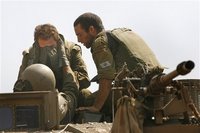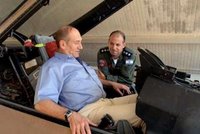Israel's Leaders Let Politics Dictate Tactics, and IDF Soldiers Pay the Price.


Yoni Tibi, in an interview on the Hugh Hewit Show this afternoon, expressed frustration and outrage at the way the Israel Defense Forces are conducting the fighting in South Lebanon. The so-called Powell Doctrine may have its critics, but its main tenet--the application of overwhelming force against the enemy--is what is called for in South Lebanon now. And that is not what is happening.
I had my first misgivings last week when Israel sent in a commando unit to a border village, to find and destroy Hezbollah arms caches and rocket arsenals. The problem was that, despite shelling and air strikes, Hezbollah fighters were still present in large numbers. Hezbollah greatly outnumbered the commandos, and of course not only knew the territory, but had prepared the ground for just such an Israeli move. Hezbollah fighters set up an ambush, and the inadequately supported commandos had to shoot their way out, taking heavy casualties.
Then Israel sent a larger armored force over the border and announced, on Saturday, the capture of a strategic village, the Hezbollah stronghold of Maroun A-Ras. However, I saw a television news report on Sunday, which showed the IDF shelling that same town. If the report was accurate, the obvious implication was that after taking the town, the IDF had withdrawn from Maroun A-Ras, and Hezbollah fighters had reoccupied it.
Since then the IDF has faced very hard fighting and has been taking substanial casualites in its effort to drive Hezbollah out of Bint J’bail, a village supposedly manned by 100-200 Hezbollah fighters. The photo at the upper left tells the story, as does this story from the Associated Press. Reporter Benjamin Harvey quotes a wounded Israeli soldier, Yishai Green, who said, "It's a real mess and I am not allowed to talk about it." Yoni reported in disgust that the IDF had advised the residents of Metullah, an Israeli town on the Lebanese border, to evacuate their town because of the threat of Hezbollah guerilla counter attacks across the border. Why, Yoni asks, does that threat still exist 13 days after the opening of hostilities?
The answer, as suggested by both Yoni Tibi and former Israeli Ambassador Dore Gold in their interviews on the Hugh Hewitt Show, is that Israel is attacking with brigades instead of battalions. Also, there was an over-reliance on air power and artillery in the opening days of the war. That approach made great sense as a prelude, preparing the battlefield for a large-scale ground invasion, but the bombs and air-launched rockets could not destroy well-fortified underground bunkers and arsenals, as evidenced by the fact that Hezbollah is still launching over 100 rockets a day at Israeli cities and towns. To be successful, the work of clearing out Hezbollah requires ground troops, moving in force.
When Israel finally moved ground troops across the border, the force was inadequate. Yoni Tibi compared the size of the forces that invaded Israel in 1982, fighting the Palestinian militias who then occupied South Lebanon. Israel then employed perhaps 25 times the number of troops and tanks that it is now using in South Lebanon, against an enemy who was not as well trained or as well armed as Hezbollah.
What is going on? Part of the problem is perhaps illustrated by the photo above left. It shows Israeli Prime Minister Ehud Olmert in the cockpit of an F-16 at a visit to an air force base today. It reminds me ever so much of the famous photo of Michael Dukakis in the tank, which helped George H.W. Bush win the 1988 American Presidential election. It points up that neither Ehud Olmert, nor his Defense Minster, Amir Peretz, has extensive military experience. That is not unprecedented--neither did Levi Eshkol in 1967, Golda Meir or Menachem Begin in 1982. But those leaders at least had experienced military men such as Moshe Dayan, Yitzhak Rabin and Ariel Sharon to advise them. Those military leaders were certainly not infallible--the complaisance of some of them almost led to disaster in the Yom Kippur War, until Ariel Sharon took field command in the Sinai, and managed to ignore orders from his military and civilian superiors long enough to cross the Suez Canal, surround the Egyptian Third Army and save Israel from defeat.
In contrast, no such figure sits at the right hand of Olmert or Peretz. Instead, for the first time, the Israeli Chief of Staff is an Air Force General, Dan Halutz, who might naturally be suspected to overly rely on air power.
The other factor that may be influencing Israel's poor tactical decisions is fear of "the Lebanese mud," the Israeli term for the 18-year occupation of a buffer zone in South Lebanon following the 1982 invasion. However, without minimizing the loss of lives and thje wounded over those 18 years, the disaster of the Lebanese occupation was political, not military. If fear of occupying land in Lebanon causes Israel to fight against Hezbollah with insufficient ground forces, and to refuse to hold territory, the disaster this time will be both military and political. As may pundits have noted over the past few days, if Hezbollah merely survives Israel's attacks as an organized military force still in control of South Lebanon, it will have won a great strategic victory. Moreover, as international political pressure builds on Israel to agree to a ceasefire, time is short. Israel's politicians may well succeed in snatching defeat out of the jaws of victory.





0 Comments:
Post a Comment
<< Home